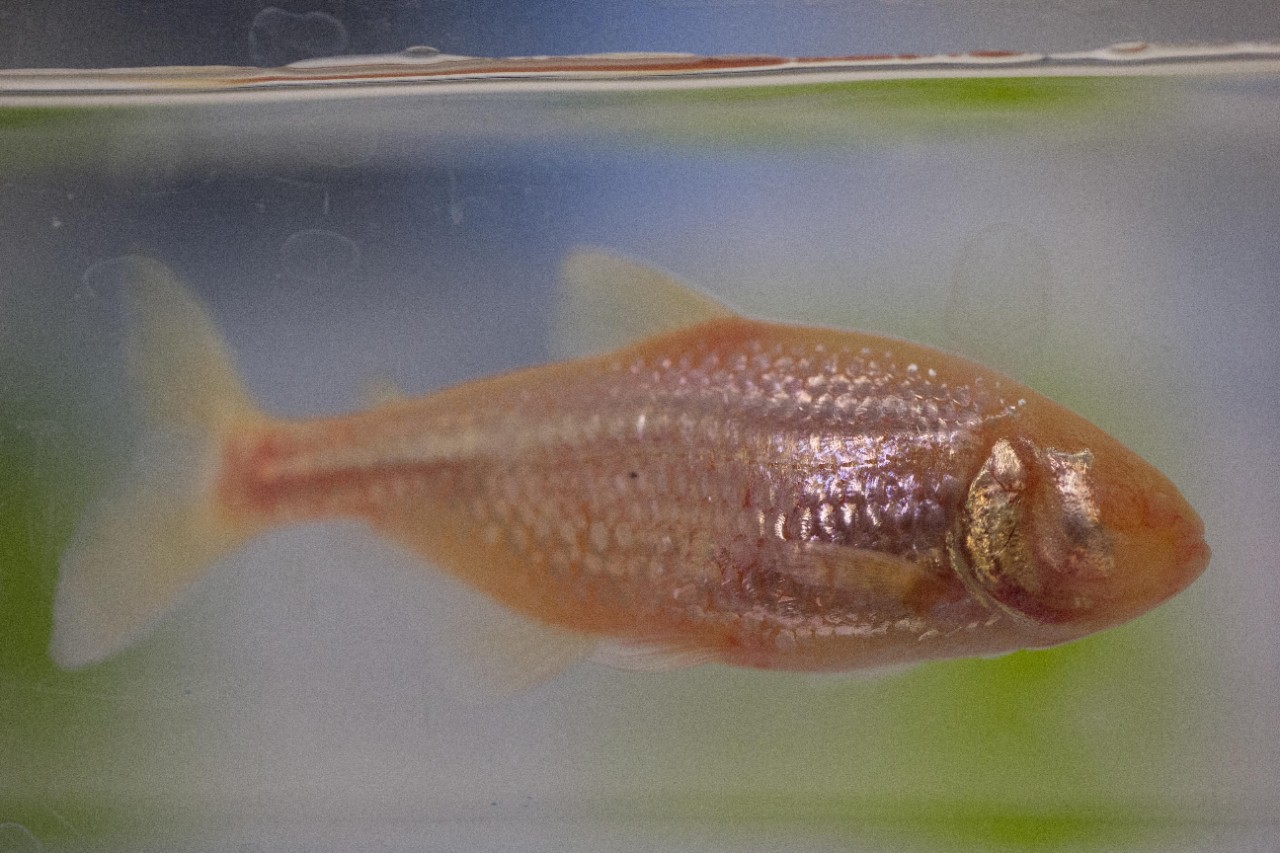
WaPo: Cavefish offer clues to future of human couch potatoes
UC biologist explains sedentary behavior of blind cavefish
The Washington Post turned to a University of Cincinnati biologist to explain how the evolution of Mexican blind cavefish could offer clues to our future evolution given people's increasingly sedentary lifestyles.

UC associate professor Joshua Gross. Photo/Andrew Higley/UC Marketing + Brand
Even people who are active every day had trouble maintaining their lifestyle during the COVID-19 pandemic when gyms, parks, playgrounds and group activities were shut down for social distancing, the Post said.
But UC College of Arts and Sciences associate professor Joshua Gross told the Post that our sedentary lifestyle does not compare to that of the Mexican blind cavefish.
Gross studies the fish and their interesting evolutionary path in his biology lab. The fish were swept deep underground by flooding more than 160,000 years ago and over thousands of generations evolved in dark world that had little food to offer. They lost eyes that had become useless in their dark world while developing other characteristics that help them survive.
Meanwhile, their ancestors continue to thrive on the surface, giving scientists a unique opportunity to compare the animals side by side to see how they diverged.
The Post turned to Gross to explain a new study in the Proceedings of the National Academies of Science that examined how the fish evolved to swim slowly, starve for long periods and get by with less muscle mass and more fat. He was not part of the research.
“What I felt was interesting is that in humans, it has been long understood that a sedentary lifestyle leads to pretty negative health outcomes, but those come within a lifetime,” Gross told the Post. “This study provides an idea of how inactivity can play out not just in a lifetime, but in long-term evolutionary changes.”
In his biology lab, Gross and his students have learned more about how cavefish survive and navigate their low-nutrient, low-oxygen environment.
Read the Washington Post story.
Read more about UC's blind cavefish research.
Featured image at top: A Mexican blind cavefish swims in a UC biology lab. Photo/Andrew Higley/UC Marketing + Brand
Related Stories
History Department Lecture
January 9, 2002
Lecture by Allan W. Winkler, Miami University, Oxford on "Urban America in World War II: Cincinnati as an example" at the Cincinnati Museum Center at 7:30pm.
UC Research Ranking Climbs
January 10, 2002
The University of Cincinnati moved up in two different national rankings established by the National Science Foundation (NSF) to compare college and university research efforts.
History Department Lecture
January 17, 2002
Lecture by Leslie Adelson, Cornell University, will deliver a Taft lecture titled "Back to the Future and Beyond 'Two Worlds':Turkish Lines of Thought in Contemporary German Literature and Memory Work" at 3:00pm in the Max Kade German Cultural Center in Old Chemistry.
New Appointments in McMicken Administration
January 21, 2002
The college is very pleased to announce two new appointments.
Sign Up for the Discovering A&S Elective
January 24, 2002
Parent's Asking, "What does someone do with THAT major?" Don't know all your options? Sign up for a 2 credit hour elective where you can meet A&S faculty, emeriti faculty, as well as, alumni.
Three of Four UC Fulbrights Scholars from McMicken
January 28, 2002
Tainted water supplies in Bangladesh, international security and missile defense, transformations in Mexico and greater understanding of India - this varied list sums up the work of four Fulbright Scholars at the University of Cincinnati who are concentrating on real-life issues involving our neighbors around the world.
Prominent Line-Up Examines Race in 2002 Ropes Series
January 31, 2002
The issue of race will receive one of the most intensive examinations undertaken in Cincinnati since the April riots when the University of Cincinnati Department of English launches its Ropes series in January and February 2002.
Nominate a Distinguished Alumni
January 31, 2002
The Purpose of the Distinguished Alumni Awards is to recognize graduates of the McMicken College of Arts and Sciences for outstanding achievements.
UC Physicists Play Important Role in Experiments That Provided New Understanding of Neutrinos
January 31, 2002
Three physicists at the University of Cincinnati played a key role in recent experiments which provided a surprising new understanding of a tiny subatomic particle known as the neutrino.
Angelene Jamison-Hall: Publishing Award
February 13, 2002
An unpublished novel by Angelene Jamison-Hall won first place in the new writing contest sponsored by River View Publishing in Riverside, Iowa.
